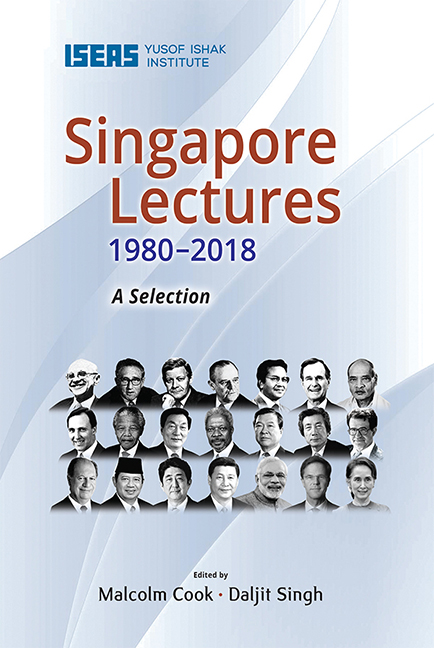Book contents
- Frontmatter
- Contents
- Introduction
- 1 The Invisible Hand in Economics and Politics
- 2 American Foreign Policy: A Global View
- 3 The Soviet Union: Challenges and Responses as Seen from the European Point of View
- 4 Trends in the International Financial System
- 5 Regionalism, Globalism and Spheres of Influence: ASEAN and the Challenge of Change into the 21st Century
- 6 US Policy in the Asia-Pacific Region: Meeting the Challenges of the Post-Cold War Era
- 7 India and the Asia-Pacific: Forging a New Relationship
- 8 Australia, Asia and the New Regionalism
- 9 South and Southern Africa into the Next Century
- 10 China and Asia in the New Century
- 11 Global Values: The United Nations and the Rule of Law in the 21st Century
- 12 Peace on the Korean Peninsula and East Asia
- 13 Japan and ASEAN in East Asia: A Sincere and Open Partnership
- 14 EU and Asia: Sharing Diversity in an Inter-regional Partnership
- 15 Global Challenges in the 21st Century: A View from Chile
- 16 Indonesia: The Challenge of Change
- 17 Japan and ASEAN, Always in Tandem: Towards a More Advantageous Win-Win Relationship through My “Three Arrows”
- 18 Forging a Strong Partnership to Enhance Prosperity of Asia
- 19 India’s Singapore Story
- 20 The Netherlands, Singapore, Our Regions, Our World: Connecting Our Common Future
- 21 Democratic Transition in Myanmar: Challenges and the Way Forward
- The Singapore Lecture Series
- The Editors
12 - Peace on the Korean Peninsula and East Asia
Published online by Cambridge University Press: 09 October 2021
- Frontmatter
- Contents
- Introduction
- 1 The Invisible Hand in Economics and Politics
- 2 American Foreign Policy: A Global View
- 3 The Soviet Union: Challenges and Responses as Seen from the European Point of View
- 4 Trends in the International Financial System
- 5 Regionalism, Globalism and Spheres of Influence: ASEAN and the Challenge of Change into the 21st Century
- 6 US Policy in the Asia-Pacific Region: Meeting the Challenges of the Post-Cold War Era
- 7 India and the Asia-Pacific: Forging a New Relationship
- 8 Australia, Asia and the New Regionalism
- 9 South and Southern Africa into the Next Century
- 10 China and Asia in the New Century
- 11 Global Values: The United Nations and the Rule of Law in the 21st Century
- 12 Peace on the Korean Peninsula and East Asia
- 13 Japan and ASEAN in East Asia: A Sincere and Open Partnership
- 14 EU and Asia: Sharing Diversity in an Inter-regional Partnership
- 15 Global Challenges in the 21st Century: A View from Chile
- 16 Indonesia: The Challenge of Change
- 17 Japan and ASEAN, Always in Tandem: Towards a More Advantageous Win-Win Relationship through My “Three Arrows”
- 18 Forging a Strong Partnership to Enhance Prosperity of Asia
- 19 India’s Singapore Story
- 20 The Netherlands, Singapore, Our Regions, Our World: Connecting Our Common Future
- 21 Democratic Transition in Myanmar: Challenges and the Way Forward
- The Singapore Lecture Series
- The Editors
Summary
President Kim Dae-jung of the Republic of Korea gave the 19th Singapore Lecture on 27 November 2000. He was introduced by Deputy Prime Minister Lee Hsien Loong. President Kim was awarded the 2000 Noble Peace Prize for his efforts to improve the lives of the Korean people at great personal cost, and to reach out to North Korea through his “Sunshine Policy” which resulted in the historic first summit meeting between leaders of the two Koreas in Pyongyang. The lecture focuses on inter-Korean relations and their importance to East Asia.
Thank you, Deputy Prime Minister Lee Hsien Loong, for that very warm introduction.
Your Excellency, Prime Minister Goh Chok Tong, Deputy Prime Minister Lee Hsien Loong, Chairman Chia Cheong Fook, and Director Chia Siow Yue of ISEAS, distinguished guests, ladies and gentlemen.
I am infinitely honoured to be given this opportunity to speak at the prestigious Singapore Lecture organized by the world-renowned Institute of Southeast Asian Studies. Under the outstanding leaderships of Prime Ministers Lee Kuan Yew and Goh Chok Tong, Singapore has attained the highest levels in international competitiveness, as well as social stability and welfare. I am quite aware that behind this national feat has been the input of such an outstanding think-tank as the Institute of Southeast Asian Studies.
Ladies and gentlemen, history tells us that peace on the Korean Peninsula has far-reaching implications for the fate of East Asia as a whole. At the end of the 19th century, imperial Japan was victorious in war against China and Russia in the early 20th century, and thus colonized the Korean Peninsula. Building upon this strength, Japan went on to invade mainland China, and further—Malaysia, Singapore, and Indonesia.
More recently, the Korean War of the early 1950s, which is still a vivid memory for many of us here, affected most countries of East Asia, directly or indirectly. Because of the unique geopolitical location, peace on the Peninsula is closely linked to that of East Asia.
It has been fifty years since the Korean War broke out. During the half century since, South and North Korea have lived as hostile enemies in extreme distrust of each other.
- Type
- Chapter
- Information
- Singapore Lectures 1980-2018 , pp. 200 - 209Publisher: ISEAS–Yusof Ishak InstitutePrint publication year: 2020

